 Last week, I went to see Malev, a recent historical epic/parody, and one of the small number of Estonian feature films made each year. It was an interesting combination of Estonian history (covering the first of many attempts to keep conquerors -- this time German crusaders -- from taking over), parody of historical epics like Braveheart, and a parody of the Estonia's own cultural tendencies. The story is the basic tale of European nationhood: assorted tribes and cultural and linguistic sub-groups, normally existing independently, have to unite to face a common foe.
Last week, I went to see Malev, a recent historical epic/parody, and one of the small number of Estonian feature films made each year. It was an interesting combination of Estonian history (covering the first of many attempts to keep conquerors -- this time German crusaders -- from taking over), parody of historical epics like Braveheart, and a parody of the Estonia's own cultural tendencies. The story is the basic tale of European nationhood: assorted tribes and cultural and linguistic sub-groups, normally existing independently, have to unite to face a common foe.
Uru, the main character, is taken away from his homeland at an early age to be whipped, beaten and (literally) shat on by various members of the church hierarchy. It's hard to explain how this is funny. One tangental explanation is that (and this seems to be a tendency in smaller, historically oppressed nations) self-deprecation is a prevailing mode of comedy in Estonia. Years of enslavement, serfdom, and seemingly futile wars of liberation are an integral part of Estonians' historical and cultural identity, so Malev's absurdly (though not unrealistically) exaggerated version of that got some laughs.
Mentored by a member of the Knights Templars (who wants to foil Germany's expansion) in the ways of war, Uru returns to unite his people to fight the invaders. The Estonians, however, ignore him as soon as it's time to sing (an Estonian passtime, to say the least) and party. Lembitu, who is generally thought of as an Estonian hero who led the fight against the invading Germans, is portrayed as being too busy (absurdly) planing large pieces of wood to listen to Uru's warnings.
I mention all of this by way of contrast to epics like Braveheart. We Anglos have the earnestness of Mel Gibson, and we have over the top absurdity of Monty Python and Mel Brooks, but there's not much in between. In Malev, they somehow managed to combine the historical epic (with historical research, costumes, elaborate sets) with the absurdist response to it.
When the German army finally attacks, Uru has the Estonians "hold... hold..." until the Germans run into their secret weapon: wooden rakes which they step on, knocking out the first line. Then the Estos attack.
There were a lot of historical references to Estonian culture that I had no clue about, but that's a sketch from a groggy, half-fluent filmgoer.
There were also some references to the current political situation. At one point, the Estonians sent for help from the Russians. Me anname nendele kartuleid, Lembitu exclaimed, as if stuck by sudden inspiration. We'll give them potatoes. Estonia currently has 40 soldiers in Iraq, which might also be metaphorically considered as a variety of diminuitive tuber.
Estonia also has a history of asking for help from one powerful country to repel an invader, only to have their ally stick around and seize power after helping out.
One thing that is definitely not lacking in Estonia is internet access. There are hundreds of Wifi (pronounced vee-fee, with a lively lingering on the f sound, as in "jiffy") hotspots around the country. There's even a website that lists all of them. Wifi.ee estimates that 45,000 square km have Wifi access. This, in a country with a third of the population of Montreal.
The official internet policy here mandates free net access points "within cycling distance" of where people live. There's also talk of expanding existing free Wifi access (in parks, schools, libraries and beaches) to the entire city of Tallinn.
Would that wifi-impoverished Montreal (much less the feds) would take their cue from places like Estonia. Then again, Montrealers generally seem to have better things to do in coffeeshops than sit in front of laptops. That being one of the main reasons I love the city, I won't complain too loudly.
(Lots of software development here, too. Heard of Kazaa or Skype? Both were made in Tallinn, or so I hear. Skype's head offices are here, in any case. More dubiously, one of Hotmail's main investors was Estonian.)
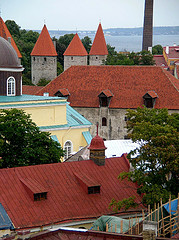 Anyone see the movie Red Dawn. I actually haven't, but the basic premise is that the Soviet Union invades the US. Which is to say, the film is rightfully the subject of ridicule, and that's before you get to the part where a bunch of high school kids (Patrick Swayze and Charlie Sheen among them) defeat the red army.
Anyone see the movie Red Dawn. I actually haven't, but the basic premise is that the Soviet Union invades the US. Which is to say, the film is rightfully the subject of ridicule, and that's before you get to the part where a bunch of high school kids (Patrick Swayze and Charlie Sheen among them) defeat the red army.
But the possibility of a Russian invasion actually feels real to folks in Estonia, and it seems to be not quite the paranoid right wing fantasy that it is in the US.
I was reminded of all this when a Russian fighter-bomber mysteriously crashed in Latvia the other day. The same day, a Russian military plane flying through Estonia went off of its flight path and onto a civilian flight corridor (not sure of the terminology in English). Apparently this is just the last in a long string of provocations. The previously favoured method, I hear, was to fly fighters at top speed toward the Estonian border and turn away at the last minute. (In other recent news, Russia withdrew from the treaty it had signed a few months earlier. Negotiations leading up to the signing. Also, check out the selective coverage of the fighter incident in the Russian media.)
As I said before, a key part, if not the defining characteristic of Estonian foreign and domestic policy has been to avoid being conquered (for the nth time) by the Russians. This has been a primary motivation for joining NATO, the EU, the WTO, the IMF sending troops to Iraq (two of whom have been killed) and Afghanistan, giving Bush Sr. some kind of medal yesterday (he promised to mention his kind treatment by the Estonian government to his son), and so on.
Despite all this, uncertainty reigns. A few evenings ago, Lauri and I had a big chat about the state of Estonia and the world. He reckoned that obviously there's no chance that Russia will invade under the current conditions. But over the next fifty years, the EU could very well break up, or who-knows-what could change, and it would be the same thing once again.
While I'm not sure if most or even many people think about an invasion, there's certainly an overwhelming nervousness about what Moscow's got cooking.
Apparently, the Kaitseliit, the National Guard, is trained mostly in guerilla warfare, the idea being that [whoever] can go ahead and invade. If they try to occupy, though, they'll have a rather rough go of it. "A patriot behind every tree," or something like that.
In any case, I can now say firsthand that there's a (big!) difference between fearing a genocidal occupation and fearing a terrorist attack. Score one for basic truths.
Z Magazine: Media Reform and Media Revolution: A Critique of Free Press and the National Conference on Media Reform
Dominion: FEMA Turned Away Aid, Rescue Crews, Cut Emergency Communication Lines: Witnesses
Dominion: The Battle of New Orleans
Dominion: New Orleans is sinking, man, and I don't wanna talk about climate change
[caveat lector: these are first impressions based on deeply incomplete information--hopefully, in that respect, unlike some other things I write.]
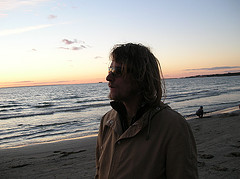 "Just turn it off," Aadam says in English with an exagerrated Estonian accent. On the way from the airport, I had remarked at the large number of ads for political parties. There are elections coming up, he concedes, but he doesn't know when and doesn't really care. Politicians do whatever they want. Igasugused intriigid, all kinds of intrigues and scandals are in the papers, with politicians going back and forth between parties. So Aadam doesn't care; in any case, he's tuned out the political background noise, and says he doesn't notice the ads anymore.
"Just turn it off," Aadam says in English with an exagerrated Estonian accent. On the way from the airport, I had remarked at the large number of ads for political parties. There are elections coming up, he concedes, but he doesn't know when and doesn't really care. Politicians do whatever they want. Igasugused intriigid, all kinds of intrigues and scandals are in the papers, with politicians going back and forth between parties. So Aadam doesn't care; in any case, he's tuned out the political background noise, and says he doesn't notice the ads anymore.
But it also seems that there's very little in the way of activism. Though the vast majority of the population is against the war, for example, but the government--like many others in Europe--has been enthusiastically on side. The stand (and other kowtowing) is generally understood to be for the principle purpose of securing the good graces of the Americans, which is overwhelmingly seen as favourable any graces of the Russians. Indeed, the foreign policy focus of the first decade-and-some after independence was gaining NATO and EU membership, primarily to stave off another Russian invasion, or incursion.
There are a few subversive filmmaker types and a well-known anarchist lead singer of a folk-punk band who wrote a book on the history of anarchism, but very little organizing. According to Aadam (who is a distant relative of mine) young people are simply laisad, lazy. (All of this was said with a half-joking, cynical tone, in casual conversation.)
The main exceptions to the rule of no grassroots movements seems to be rohalised, greens, and the pensioners. I actually don't know anything about the pensioners, except that they protest at the Parliament building on occasion, live on very small cheques from the government, and are a key constituency to appeal to if you're a politician.
Rohelised
The "green" movement here differs markedly from the North American or even Western European version in that it seems to stem--almost universally--from a pre-existing socio-cultural dependence on the land, rather than from a combination of economic, aesthetic and moral considerations. In other words, I don't think it's so much of a political choice to think ecologically as it is a prerequisite of understanding one's own identity.
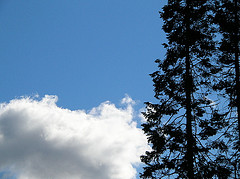 Estonian green philosophy differs ontologically in a key respect as well. There's much less emphasis on keeping anything pristine (which ends up being a key rhetorical if not through-and-through political point in N. America), because people have been living here for thousands of years, and have had a huge impact on the landscape. It's just that that impact has been a dialogue (punctuated, no doubt, by shouting matches) with the regional ecology, rather than a one sided exploitation of it. While there's some talk of preservation, it mostly seems to be a matter of amplifying practices that have developed over millenia (though they may have been sidetracked by Soviet über-industrialism and hyper-exploitation of the landscape in the last half-century).
Estonian green philosophy differs ontologically in a key respect as well. There's much less emphasis on keeping anything pristine (which ends up being a key rhetorical if not through-and-through political point in N. America), because people have been living here for thousands of years, and have had a huge impact on the landscape. It's just that that impact has been a dialogue (punctuated, no doubt, by shouting matches) with the regional ecology, rather than a one sided exploitation of it. While there's some talk of preservation, it mostly seems to be a matter of amplifying practices that have developed over millenia (though they may have been sidetracked by Soviet über-industrialism and hyper-exploitation of the landscape in the last half-century).
It's still very much an indigenous culture; ecology is present in many of the key metaphors that make up written and spoken Estonian.
(It seems that Canadian environmentalists could learn a bit from this. In addition to talking about the ecological necessity of preserving, say, the Boreal forest, they could also stand to talk a bit more with the folks who depend on it for their survival.)
N. American movements, on the other hand, seem to have much more of an analysis of the capitalist system (though I'm almost certainly prone to overestimate it as a result of the kinds of environmentalists I hang out with). Anecdotally, there doesn't seem to be as much understanding of how and why capitalism is ecologically fucked.
When celebrated Estonian naturalist Fred Jüssi was visiting a group of Estonians in Toronto a while back, someone asked him about the possibility of having a political party to represent environmentalism in Estonia. He responded that the problem is what they call tomatti rohelised, tomato greens. They start out green, but eventually turn red. And that, as they say, was that.
Broad, unfounded statement
The curious dilemma at the moment seems to be that while Soviet rule was successful in uniting the country (and getting a third of the Estonian-speaking population to turn out to one big singing protest), Capitalism has been just as effective at divvying up the country into apathetic interest groups. Marxism is so tainted, perhaps, that it's just impossibly out of fashion to express any anticapitalist sentiment.
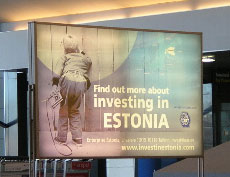 I'm back to Estonia for the first time in nine years. I grew up speaking Estonian, mostly with my mom. My first words were in Estonian, and I've long felt an inexplicably strong connection to this place--much more than I feel a connection to, say, where I grew up. I've only ever been here a handful of months in total, but I've never felt more 'at home' anywhere else.
I'm back to Estonia for the first time in nine years. I grew up speaking Estonian, mostly with my mom. My first words were in Estonian, and I've long felt an inexplicably strong connection to this place--much more than I feel a connection to, say, where I grew up. I've only ever been here a handful of months in total, but I've never felt more 'at home' anywhere else.
The last time I was here, I was sixteen. I only had a skeleton of my worldview at that point. Bones but no muscle.
So I've arrived with no plan at all, a vague intention to visit family and friends (almost all of whose primary connection is to my mother) and a set of questions about politics and history.
After a few days here, the main puzzle so far concerns the uncanny familiarity that I feel for this place. Does it come from some pre-conscious ancestral or cultural-linguistic rhizomatic entanglement? Or is it simply that capitalism has had access to the country for long enough to render it indistinguishable from any other place I've been, and thus deeply familiar in a particular way?
I doubt it's one or the other.
From Canada
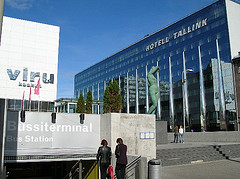 The questions I have stem from the appearance that Estonia is in many respects like Canada, except moreso. Colonized indigenous nations (Estonians have been colonized for a few hundred years more), tense relations with a settler population (though in Estonia, Russians are a minority), a small country (Estonia, pop. 1.5 million) forced to appease foreign powers.
The questions I have stem from the appearance that Estonia is in many respects like Canada, except moreso. Colonized indigenous nations (Estonians have been colonized for a few hundred years more), tense relations with a settler population (though in Estonia, Russians are a minority), a small country (Estonia, pop. 1.5 million) forced to appease foreign powers.
The main difference is that Estonia has been blindsided by capitalism. A national consensus that Soviet rule (and thus anything communist-related) really, really sucks, built up over fifty-plus years of repression, culminated in the Singing Revolution, when 250,000 people defied Russian tanks and troops to sing banned songs. Independence was declared shortly thereafter, with the collapse fo the USSR not far behind.
Since then (the) Estonia(n elite), like (that of) many former Soviet republics, embraced capitalism wholeheartedly. Like Armenia (for example), cultural freedom has expanded while the freedom to subsist has subsided. It's not quite the wholesale privatization-without-benefits of Armenia, but prices are a-rising.
What I notice on the ground right away, though, is the apparent lack of psychological defense mechanisms that decades (rather than a decade) of life under capitalism compels one to develop.
Walking around in the brand-new shopping mall there's a feverishness of consumption that I don't notice in North American malls. (I don't know how to describe it more than that. Consuming shiny things is still new and appetites are less easily satiated, I suppose. The manic new drug addict vs. the jaded long-time user.)
More tangibly, the advertising is several steps short of subtle. A prominent ad from a cell phone company proclaims that "if you really care about your kids", you'll get them a cell phone. The leader of Keskerakond, Edgar Savisaar, made substantial electoral gains after he sent all pensioners in Tallinn (where he was on city council) an extra 500EEK ($50CDN) and a card featuring a photo of him at Christmas time.
Over the next week, I'm going to try to keep track of conversations, anecdotes and photos. The comment feature doesn't work, but I'd be happy to post commentary sent to me at dru at dru dot ca.
 I met an Egyptian guy, Ahmed, on the Toronto-Frankfurt flight. He's a pilot in Egypt, and was in Canada for a week of flight simulator training. He didn't like Canada, though. Beautiful country, he said, but everything is expensive and people are busy; they don't have any time, he said. If he worked in Canada, he would make 20 times what he makes in Egypt, but he didn't want to do it. People are more relaxed in the middle east in general, according to him. You work, you don't work; you still live. The exceptions are Lebanon and Dubai, which are more European. People have less time there.
I met an Egyptian guy, Ahmed, on the Toronto-Frankfurt flight. He's a pilot in Egypt, and was in Canada for a week of flight simulator training. He didn't like Canada, though. Beautiful country, he said, but everything is expensive and people are busy; they don't have any time, he said. If he worked in Canada, he would make 20 times what he makes in Egypt, but he didn't want to do it. People are more relaxed in the middle east in general, according to him. You work, you don't work; you still live. The exceptions are Lebanon and Dubai, which are more European. People have less time there.
(And the women in Canada, he said, you can't talk to them. They might sue you. In Egypt, you talk to women, it's ok. As long as you don't touch them, everything else is fine.)
He's been all over the Middle East, but never to Iraq or Israel. He said there's too much paperwork. His colleagues flew to Israel, but they are intensively interviewed by the authorities. Why do you go to Tel-Aviv? What are you doing here?
He said rules are very relaxed in Egypt. You can drive straight ahead--he made a chopping motion with his hand--or you can go like this--he made a broad swerving motion. If the police catch you, you say "I'm sorry, brother, I won't do it again." And the police will point to the rules and tell you not to do it again. Then you're on your way.
I asked him about political freedom. He said it's ok to say "fuck the government" in Egypt, but you're not allowed to say anything bad about the President, at least until recently. It's more or less the same everywhere in the Middle East where he's travelled, he says. Saudi Arabia is loosening up a bit because of tourism, but everything happens underground. Shopping, drugs, alcohol. Life in Iraq was very hard, even before the war. Syria--he rolls his eyes--in Syria you don't criticize the government. In Jordan, everyone loves the King. Everything he does, they love it. It's true.
He says that Christians in Egypt complain about repression, but he doesn't see how it is happening. Many of them are very rich, he says. I agree that rich people sometimes complain about the limits placed on them. He says the Jews are the same way. They have a state, they are rich. Why are they always complaining? I find myself explaining the history of anti-semitism, not mentioning the Palestinians. He asks if I'm Jewish. But, I add, with Israel it's complicated because now the Jewish state is making people suffer. He says he thinks maybe that's true. Cautiously. But still, he says, they have everything. What is the problem?
We chat a bit more, and the fasten safety belt sign goes on, and we go back to our seats.